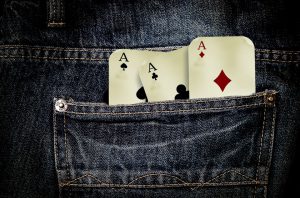
We have previously discussed how the mind is organised into neural networks. The connections formed between neurons are strengthened by repetitive actions and weakened if not activated. Thus, if certain repeated actions are performed, the aforementioned neural networks gradually form and change. These networks are the foundations of our psyche - all our knowledge and possibilities lie in these structures.
Learning can be defined as any change in the connections in our neural networks. Whenever a connection is strengthened or weakened (in any way at all), we will call it learning (excluding changes caused by injury or exhaustion). You may object that this term includes too much, but sometimes the same neural networks will make you play less well. If your mind convinces you that J4o is a successful hand, that is already a change in how your neurons interpret J4o. But do we really want to call this process learning?
Absolutely. It is important to understand that we cannot have a preconceived notion of learning or think that learning only happens when we are seriously engaged in productive learning. Cognition involves trial and error, so learning to make mistakes is an inevitable and essential part of the learning process, especially in the early stages of network development. So, to compensate for one bad habit, you have to learn two good ones.
Now let's try to put forward the claim that there is some ideal neuronal design. We can call this an "optimal network". This network is the mind of the perfect poker player - it is the perfect structure of the poker game. Your own network has its own form, probably simpler than the optimal one. If you superimposed your own structure on top of the optimal one, as if you were superimposing a copy on top of the original, all the inconsistencies between your game and the perfect game would be in the palm of your hand. All we want is to train our neural networks so that these discrepancies do not exist.
This training happens naturally because the shape of the optimal network makes the most money in the long run, and you are conditioned by what makes you money, so you are automatically attracted to that shape of network. The process is very similar to natural selection. And yet, it is difficult to achieve all this on your own. If it were simple, anyone who played millions of hands would become a great player. Why is it that, as you move towards optimal form, the road becomes blocked?
There are many reasons for this - lack of challenging situations (there is no need to play in challenging situations), constant
cognitive biases and misunderstandings, lack of critical self-awareness, factors other than money Motivation and incentives (e.g. gambling, etc.) and sometimes obstacles to sophisticated moves (such as a risky move that is effective if certain cards are available but disastrous otherwise). The learner faces all these obstacles without being steered in the right direction by anyone.
Motivation and incentives (e.g. gambling, etc.) and sometimes obstacles to sophisticated moves (such as a risky move that is effective if certain cards are available but disastrous otherwise). The learner faces all these obstacles without being steered in the right direction by anyone.
Imagine for a second that learning poker is like drawing a minefield. When you start your
the map of the poker area is very simple, you don't know what is good or bad, it's just
looks like an empty field. The real reality (the optimal one, the real poker map) is very
It's complicated, but you don't know that yet. You just see a blank map. The only way to get more information and fill in your map is by exploring. You have to discover where the mines are hiding. As you move through the area, you discover mines (bad actions) and safe zones (good actions). But in poker, unlike a real minefield, you don't lose a limb by stepping on a mine. You might lose the pot, but you're still allowed to play. Worst case scenario, you start punching the wall. So poker encourages us to take risks, to make mistakes. Explore as much as you can, find out what works and what doesn't. The more data you have, the better and faster you will get to know the territory. The ideal way to learn is the one that reveals the terrain in front of you the fastest and most thoroughly.
Learning poker is hard. If it were easy, it wouldn't be profitable. But understanding what it means to learn poker (that it is the shaping of our neural networks towards optimal structure) gives us valuable insights. It is a path of trial and error, of constant feedback and alignment. Our goal in learning is to accelerate and optimise this process as much as possible. We want to make the most of the data available, increase the rate of training neural networks and make the most of the knowledge we gain. It is absolutely true that if you don't test the potential of any skill, you don't challenge yourself, you don't improve.
An experiment was once carried out with Olympic ice skaters. It showed that the athletes who achieved the best results were the ones who made the most mistakes during rehearsals. Instead of taking making mistakes as a bad sign, think of it as a sign that you are raising your level of ability.
So the key to learning is to be willing to have a strategy that is high risk. You play Minesweeper, except that your lives never end. Spin around, make mistakes. In the end, every mistake is an opportunity to learn new lessons about the territory and to take advantage of this in the future.
Haseeb Qureshi





